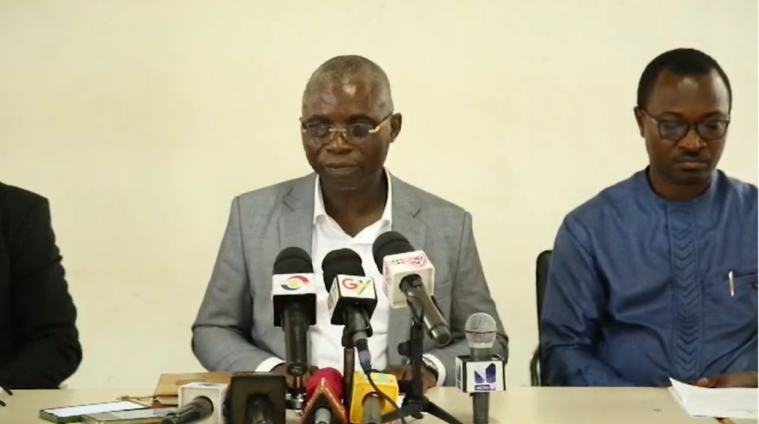The Eastern Region has recorded two additional cases of Dengue Fever, bringing the region's count to 11 the number of confirmed cases.
The cases were part of a total of 103 samples tested at the Noguchi Memorial Institute for Medical Research.
The Service on Sunday, July 14 announced the outbreak of clinical malaria in some districts of the Eastern Region.
Confirming the cases, the service explained these cases did not respond to antimalarial treatment and were therefore managed as acute febrile illnesses.
Read also: Ghana Health Service issues alert on Dengue Fever outbreak
However, the Regional Health Director, Dr. Winfred Ofosu at a press conference in Koforidua on Monday, July 15, revealed the number has risen from nine to 11 in five districts - Achiase, Akyemansa, Birim Central, Birim North and Birim South
“A total of 11 cases have been confirmed by the Noguchi Memorial Institute for Medical Research. The region is expecting feedback on 57 samples that are being worked on. The region currently is managing about 103 suspected cases,” he said.
According to him, these cases are predominant in these adjourning districts following the invasion of mosquitoes in mining and forest areas.
“Some of the community members farming around the forest in Akyiase will tell you the bites were coming from mosquitoes from the forest and now they have moved towards the communities.
“Particularly, when there is 'galamsey' and then there is no land reclamation, you have pits left and since it is rainy season, the pits are filled with water serving as breeding sites for mosquitoes increasing the mosquito population,” he explained.
He therefore advised miners to ensure that land are reclaimed after their mining expedition.
Touching on the efforts put in place to curb the fever, he said a team comprising entomologists and epidemiologists has joined the regional team to conduct a detailed outbreak investigation.
He added that “the good news is that no one has died from the Denger Fever so we need to support and treat the patient to avoid recording fatalities.
He, however, urged the public to remain vigilant and adhere to the preventive measures to curb the spread of Dengue Fever.
Overview of Dengue Fever: According to the World Health Organization (WHO), dengue is a viral infection transmitted to humans through the bite of infected mosquitoes.
Approximately half of the world's population is at risk, with an estimated 100–400 million infections occurring annually. Many dengue infections are asymptomatic or cause mild illness, but the virus can occasionally lead to severe cases and even death.
Danger and Prevention: Dengue is particularly dangerous because its prevention and control depend on vector control. There is no specific treatment for dengue or severe dengue. Early detection and proper medical care significantly reduce the fatality rates of severe dengue. Most people infected with dengue will not show symptoms, but common symptoms include high fever, headache, body aches, nausea, and rash.
Recovery typically occurs within 1–2 weeks, but severe cases may require hospitalization and can be fatal. The risk of dengue can be lowered by avoiding mosquito bites, especially during the day.
Symptoms of dengue fever include:
- High fever
- Severe headache
- Pain behind the eyes
- Muscle and joint pains
- Nausea
- Vomiting
- Swollen glands
- Rash
Latest Stories
-
Mahama orders arrest of fake anti-galamsey taskforce extorting miners
26 minutes -
Joseph Kobina Ade Shino Coker
33 minutes -
Royal Sweet Limited signs up for JoySports Invitational Tournament 2025
1 hour -
Ghanaian movie industry wasting talent – Gloria Sarfo
1 hour -
Ho West MP secures 100 international scholarships for constituents
2 hours -
Bank of America’s Bernard Mensah discusses AI, jobs and global economic pressures
2 hours -
President Mahama announces plans to build six modern sports stadia
2 hours -
Expert wants gov’t to extend NSS allowance beyond service period
2 hours -
Western North: Mahama pledges action over ‘empty slogans’
2 hours -
Ghanaian AI startup Fornix Labs pilots tool to support workload of doctors
2 hours -
CCTV captures woman allegedly stealing baby at Ajumako market
2 hours -
WAFU B Boys Cup: Black Satellites take on Benin U-20 in second group game
2 hours -
Togbe Afede lauded for exemplary leadership during Asogli Yam Festival
3 hours -
Gov’t to cancel Teacher Licensure Exam on August 30
3 hours -
Ennobled Foundation webinar empowers Ghanaian youth to leverage international experience for career growth
3 hours

